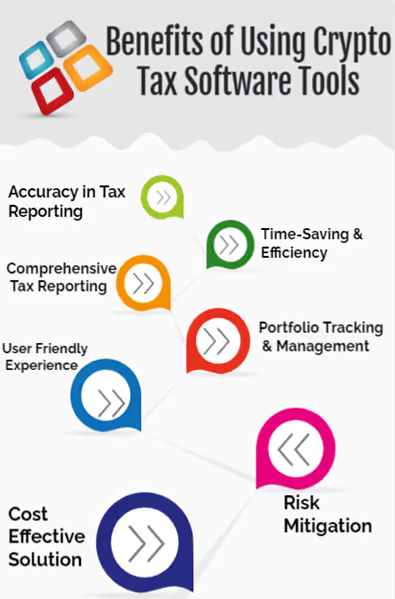.avif)
Calculate Your Crypto
Taxes in Minutes
Introduction
In John McAfee's words:
"You can't stop things like Bitcoin. It will be everywhere, and the world will have to readjust. World governments will have to readjust."
Indeed, the readjustment has taken place. Regulatory changes have been undertaken by leading economies such as the U.S., China, and Germany for crypto tax reporting. With these developments, the global scenario for cryptocurrency tax has grown highly complicated.
With crypto's volatility, accurate financial record-keeping and compliance remain essential in minimizing liabilities and ensuring smooth regulatory compliance. At such an instance, cryptocurrency tax software is a must-have: It not only automates complex calculations but also ensures compliance and safeguards against errors and the resultant costly consequences.
Why You Need Crypto Tax Software
Cryptocurrency trading involves thousands of trades, transfers, and conversions, occurring in multiple wallets and exchanges. Placing a manual track on all such activities cannot work and result in errors.
Further, depending on the tax reporting method used (FIFO, LIFO, or Specific Identification), your end tax liability may vary considerably, and tax liabilities should be favored by choice of methods but involve complex factors.

Benefits of Crypto Tax Software
A crypto tax tool represents a vital operational tool for various reasons:
- Accuracy in Tax Reporting – The software collects transaction data from different platforms to generate precise reports which reduce mistakes and follow tax regulations.
- Time-Saving & Efficiency – The tool performs bulk processing automatically and handles portfolio management to save traders time when managing complex portfolios.
- Comprehensive Reporting – The software includes FIFO, LIFO and Specific Identification methods to generate precise tax reports.
- Portfolio Tracking & Management –The software tracks DeFi, NFTs and other rising asset classes in real-time to help users make smarter decisions.
- User-Friendly Experience – The tax software features easy-to-use interfaces together with quick customer support which makes tax situations easier to handle.
- Risk Mitigation – The software delivers audit defense together with secure data protocols and protection from legal complications.
- Cost-Effective – Users can access advanced features which cost less than hiring tax professionals.
Why Kryptos is the Best Crypto Tax Software
Precision & Efficiency
The software simplifies complicated crypto tax calculations and makes sure users follow global regulations while reducing mistakes.
Comprehensive Integration
The system establishes direct links with all main exchanges and wallets and DeFi platforms to automate data collection while removing the need for manual input.
Advanced Tax Calculation
The system allows users to report capital gains through FIFO and LIFO and Specific Identification methods while tracking all trades and conversions and staking activities.
User-Centric Design
Trading platforms present user-friendly interfaces which let new users and professional traders access the system easily for faster tax management and better control.
Robust Security
Financial information remains protected through modern encryption systems which maintain both privacy and data accuracy.
Reliable Customer Support
The system offers specialized help and resources which enable users to handle difficult tax situations more effectively.
Cost-Effective Solution
The platform supports advanced tax reporting functions which operate at prices below traditional advisory fees while maintaining full value delivery to customers.
Unparalleled Crypto Tax Solution
Kryptos stands as the top choice for handling complex cryptocurrency taxes because it delivers exact results through protected operations at high speed.
Navigating the Maze of Crypto Tax Software
So, you’re diving into the wild world of cryptocurrency—where the thrill of trading meets the headache of taxes. First things first, let’s talk about your trading habits. Are you a high-frequency trader, darting in and out of positions like a hummingbird flitting from flower to flower? Or maybe you’ve got a diverse portfolio, a veritable garden of digital assets that needs careful tending. Either way, you’ll want software that’s got the chops to keep up—think advanced features that can handle the whirlwind of your trading activity...
Now, let’s not forget about the wallet—your budget, that is. It’s a balancing act, isn’t it? You want to weigh the cost against the features. Sure, a premium tool might seem like a splurge, but for frequent traders, it could be the golden ticket to long-term value. It’s like investing in a sturdy pair of shoes for a marathon—you’ll thank yourself later...
And what about support? Some software options come with a safety net—access to tax advisors and full-service filing for those tangled, complex scenarios. It’s like having a seasoned guide in the jungle of crypto taxes, ready to help you navigate the tricky paths...
Future-proofing is another piece of the puzzle. The crypto landscape is ever-shifting, with trends like DeFi and NFTs popping up faster than you can say “blockchain.” You’ll want a solution that’s agile enough to adapt to these changes, keeping you compliant as regulations evolve...
Enter Kryptos. This platform ticks all the boxes—scalable solutions that grow with you, professional support that feels like having a trusted ally by your side, and tools that are ready for whatever the future throws your way.
Wrapping It Up
In this ever-evolving realm of crypto taxation, precision, adaptability, and compliance aren’t just buzzwords—they’re your lifeline. Kryptos shines brightly, offering:
- Smooth integration with exchanges, wallets, and those funky DeFi platforms
- Spot-on, automated tax calculations for all your trades, conversions, and staking activities
- Support for the latest assets like NFTs and DeFi—because who wants to be left in the dust?
- A user-friendly interface that won’t make you feel like you’re deciphering hieroglyphics, plus rock-solid security measures
- A cost-effective solution that feels like a premium experience without breaking the bank
Kryptos is not just another tool; it’s shaping the future of Web3 finance with a standardized financial data protocol that connects over 5,000 platforms. It’s empowering developers, businesses, and YOU—yes, YOU—to manage real-time financial analytics, portfolio management, and tax reporting with ease.
So, when it comes to choosing your crypto tax software, think Kryptos. It’s your ticket to staying compliant, minimizing risks, and confidently tackling your crypto tax obligations—today and tomorrow. Because let’s face it, who wants to be caught off guard when tax season rolls around?
| Step | Form | Purpose | Action |
|---|---|---|---|
| 1 | 1099-DA | Reports digital asset sales or exchanges | Use to fill out Form 8949. |
| 2 | Form 1099-MISC | Reports miscellaneous crypto income | Use to fill out Schedule 1 or C. |
| 3 | Form 8949 | Details individual transactions | List each transaction here. |
| 4 | Schedule D | Summarizes capital gains/losses | Transfer totals from Form 8949. |
| 5 | Schedule 1 | Reports miscellaneous income | Include miscellaneous income (if not self-employment). |
| 6 | Schedule C | Reports self-employment income | Include self-employment income and expenses. |
| 7 | Form W-2 | Reports wages (if paid in Bitcoin) | Include wages in total income. |
| 8 | Form 1040 | Primary tax return | Summarize all income, deductions, and tax owed. |
| Date | Event/Requirement |
|---|---|
| January 1, 2025 | Brokers begin tracking and reporting digital asset transactions. |
| February 2026 | Brokers issue Form 1099-DA for the 2025 tax year to taxpayers. |
| April 15, 2026 | Deadline for taxpayers to file their 2025 tax returns with IRS data. |
| Timeline Event | Description |
|---|---|
| Before January 1, 2025 | Taxpayers must identify wallets and accounts containing digital assets and document unused basis. |
| January 1, 2025 | Snapshot date for confirming remaining digital assets in wallets and accounts. |
| March 2025 | Brokers begin issuing Form 1099-DA, reflecting a wallet-specific basis. |
| Before Filing 2025 Tax Returns | Taxpayers must finalize their Safe Harbor Allocation to ensure compliance and avoid penalties. |
| Feature | Use Case Scenario | Technical Details |
|---|---|---|
| Automated Monitoring of Transactions | Alice uses staking on Ethereum 2.0 and yield farming on Uniswap. Kryptos automates tracking of her staking rewards and LP tokens across platforms. | Integrates with Ethereum and Uniswap APIs for real-time tracking and monitoring of transactions. |
| Comprehensive Data Collection | Bob switches between liquidity pools and staking protocols. Kryptos aggregates all transactions, including historical data. | Pulls and consolidates data from multiple sources and supports historical data imports. |
| Advanced Tax Categorization | Carol earns from staking Polkadot and yield farming on Aave. Kryptos categorizes her rewards as ordinary income and investment income. | Uses jurisdiction-specific rules to categorize rewards and guarantee compliance with local tax regulations. |
| Dynamic FMV Calculation | Dave redeems LP tokens for Ethereum and stablecoins. Kryptos calculates the fair market value (FMV) at redemption and during sales. | Updates FMV based on market data and accurately calculates capital gains for transactions. |
| Handling Complex DeFi Transactions | Eve engages in multi-step DeFi transactions. Kryptos tracks value changes and tax implications throughout these processes. | Manages multi-step transactions, including swaps and staking, for comprehensive tax reporting. |
| Real-Time Alerts and Updates | Frank receives alerts on contemporary tax regulations affecting DeFi. Kryptos keeps him updated on relevant changes in tax laws. | Observe regulatory updates and provide real-time alerts about changes in tax regulations. |
| Seamless Tax Reporting Integration | Grace files taxes using TurboTax. Kryptos integrates with TurboTax to import staking and yield farming data easily. | Direct integration with tax software like TurboTax for smooth data import and multi-jurisdictional reporting. |
| Investor Type | Impact of Crypto Tax Updates 2025 |
|---|---|
| Retail Investors | Standardized crypto reporting regulations make tax filing easier, but increased IRS visibility raises the risk of audits. |
| Traders & HFT Users | To ensure crypto tax compliance, the IRS is increasing its scrutiny and requiring precise cost-basis calculations across several exchanges. |
| Defi & Staking Participants | The regulations for reporting crypto transactions for staking rewards, lending, and governance tokens are unclear, and there is a lack of standardization for decentralized platforms. |
| NFT Creators & Buyers | Confusion over crypto capital gains tax in 2025, including the taxation of NFT flips, royalties, and transactions across several blockchains. |
| Crypto Payments & Businesses | Merchants who take Bitcoin, USDC, and other digital assets must track crypto capital gains for each transaction, which increases crypto tax compliance requirements. |
| Event | Consequences | Penalties |
|---|---|---|
| Reporting Failure | The tax authorities can mark uncontrolled revenues and further investigate. | Penalty fines, interest on unpaid taxes and potential fraud fees if they are deliberately occurring. |
| Misreporting CGT | Misreporting CGT Error reporting profits or losses can trigger the IRS audit. | 20% fine on under -ported zodiac signs, as well as tax and interest. |
| Using decentralized exchanges (DEXs) or mixers without records | The IRS can track anonymous transactions and demand documentation. | Possible tax evasion fee and significant fine. |
| Disregarding Bitcoin mining tax liabilities | Mining reward is considered taxable income, and failure of the report can be regarded as tax fraud. | Further tax obligations, punishment and potential legal steps. |
| Foreign crypto holdings: Non-disclosure | Foreign-accepted crypto FATCA may be subject to reporting rules. | Heavy fines (up to $ 10,000 per fracture) or prosecution for intentional non-transport. |
File Your Crypto Tax in Minutes








